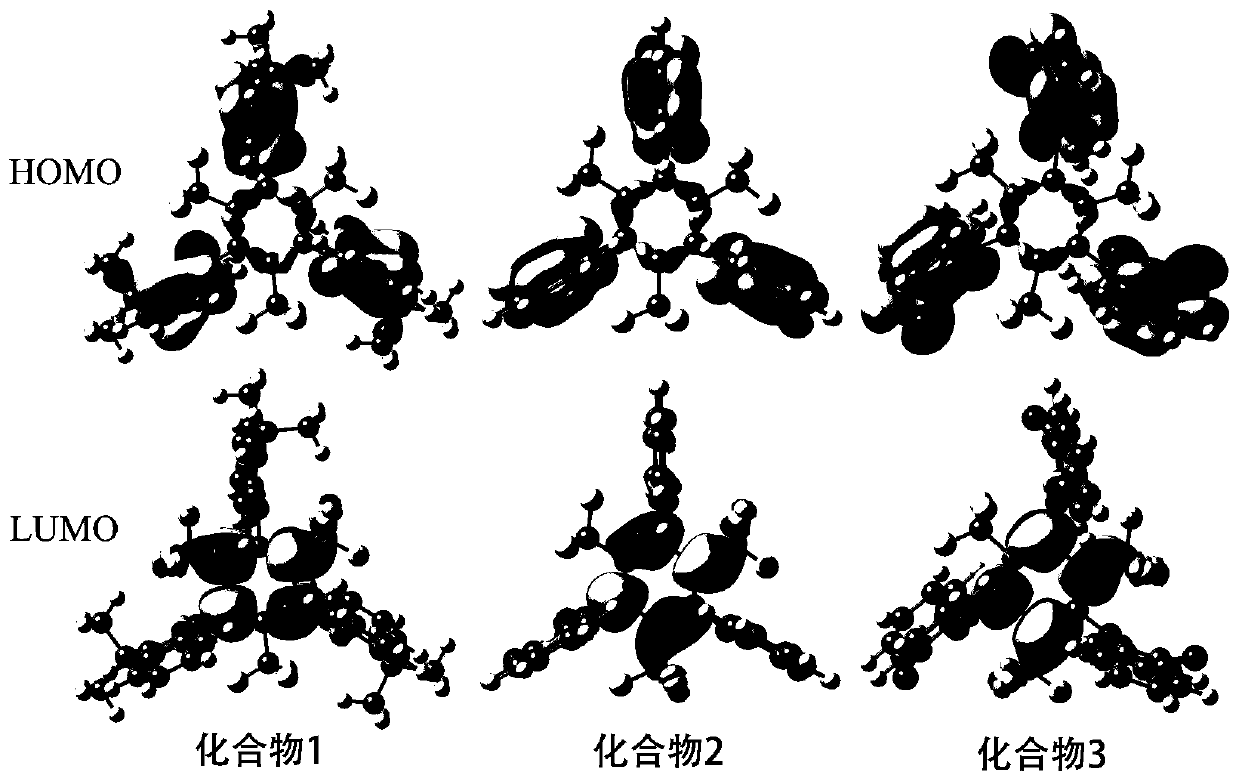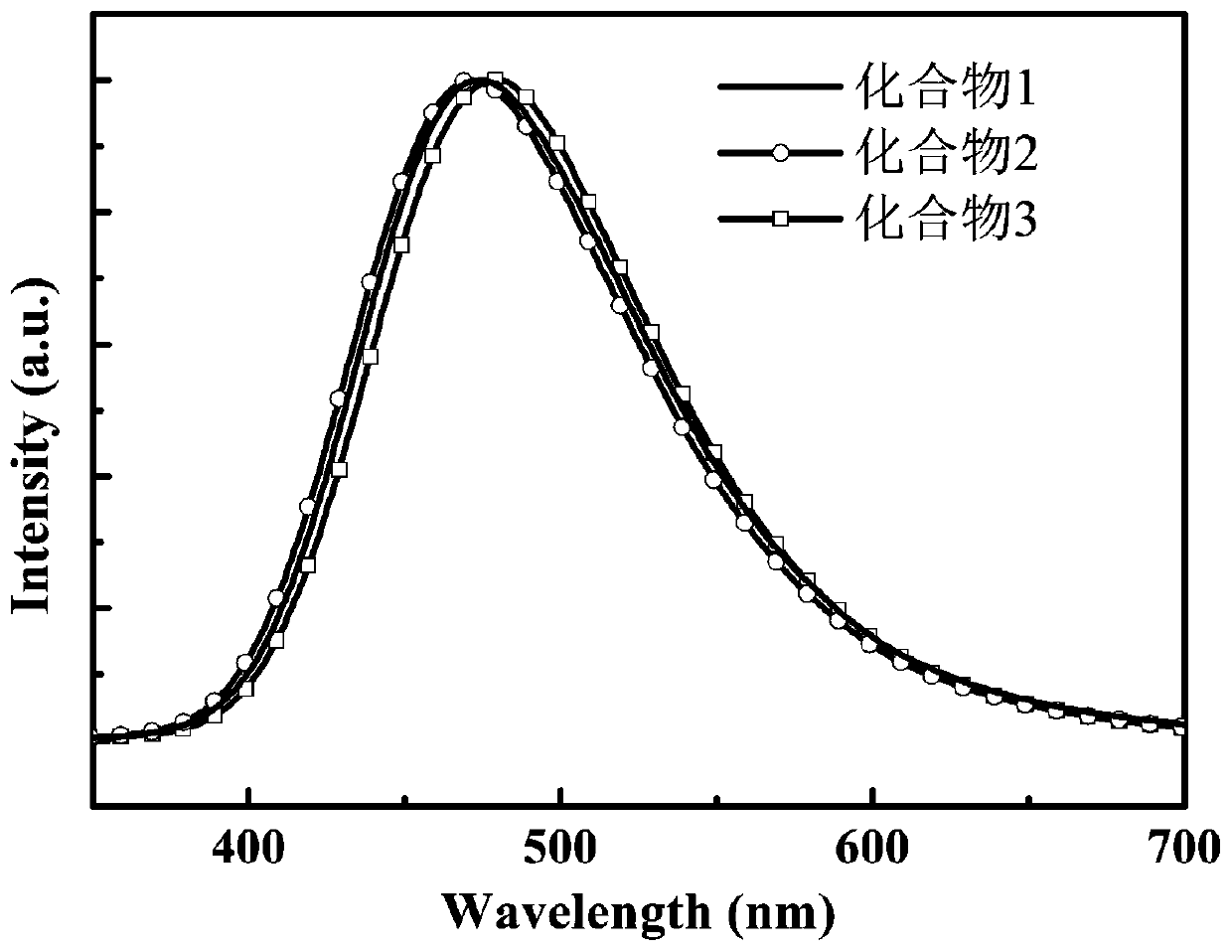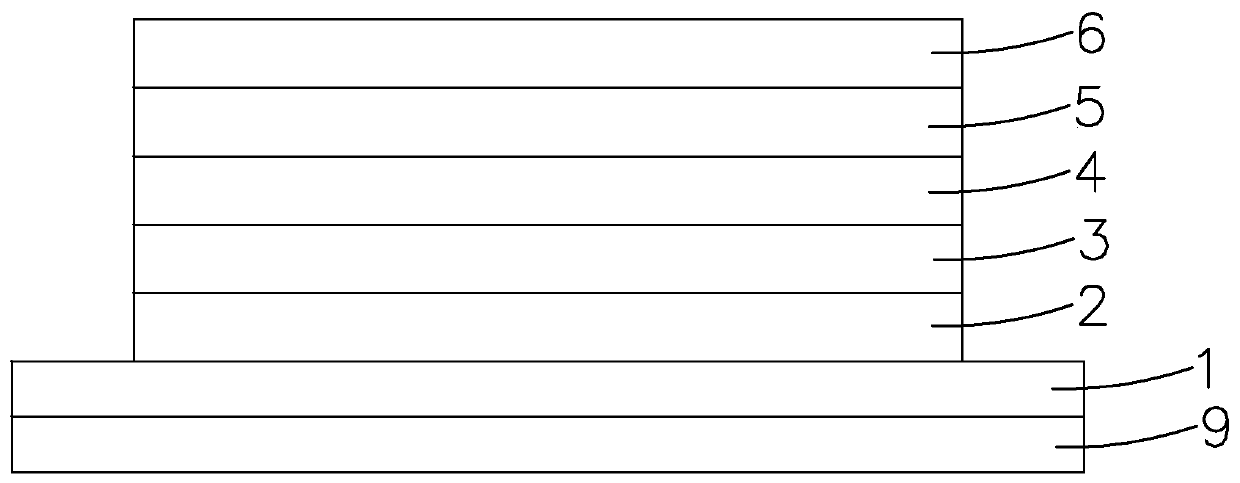Thermally activated delayed fluorescence compound and its preparation method and organic electroluminescent diode device
A technology of heat-activated delayed and fluorescent compounds, which is applied in the fields of electric solid-state devices, chemical instruments and methods, organic chemistry, etc., can solve the problems of lack of heavy metal Ir complexes, achieve high device efficiency, and improve the effect of luminous efficiency
- Summary
- Abstract
- Description
- Claims
- Application Information
AI Technical Summary
Problems solved by technology
Method used
Image
Examples
Embodiment 1
[0043] The synthetic route of target compound 1 is as follows:
[0044]
[0045] Add raw material 1 (2.56g, 5mmol), 9,10-dihydro-9,9-dimethylacridine (3.76g, 18mmol), palladium acetate Pb (OAc) (135mg, 0.6mmol) in 100mL two-necked flask ) and tri-tert-butylphosphine tetrafluoroborate (t-Bu) 3 HPBF 4 (0.51g, 1.8mmol), then sodium tert-butoxide NaOt-Bu (1.74g, 18mmol) was added in the glove box, and 40mL of toluene that had been dehydrated and deoxygenated was injected under an argon atmosphere, and reacted at 120°C for 24 hours . Cool to room temperature, pour the reaction solution into 200mL ice water, extract three times with dichloromethane, combine the organic phases, spin into silica gel, and separate and purify by column chromatography (dichloromethane:n-hexane, v:v, 1:1) to obtain 3.0 g of compound 1 as blue-white powder, yield 66%.
[0046] 1H NMR (300MHz, CD2Cl2, δ): 7.19-7.14 (m, 18H), 6.95 (d, J=6.9Hz, 6H), 1.69 (s, 18H).
[0047] MS(EI)m / z:[M] + calcd for C...
Embodiment 2
[0049] The synthetic route of target compound 2 is as follows:
[0050]
[0051] Add raw material 1 (2.56g, 5mmol), phenoxazine (3.30g, 18mmol), palladium acetate (135mg, 0.6mmol) and tri-tert-butylphosphine tetrafluoroborate (0.51g, 1.8mmol) in 100mL two-necked flask mmol), then sodium tert-butoxide (1.74 g, 18 mmol) was added into the glove box, and 40 mL of toluene previously dehydrated and deoxygenated was poured into the glove box under an argon atmosphere, and reacted at 120° C. for 24 hours. Cool to room temperature, pour the reaction solution into 200mL ice water, extract three times with dichloromethane, combine the organic phases, spin into silica gel, and separate and purify by column chromatography (dichloromethane:n-hexane, v:v, 1:1) to obtain 2.7 g of compound 2 as blue-white powder, yield 65%.
[0052] 1 H NMR (300MHz, CD 2 Cl 2 ,δ): 7.14 (d, J=7.2Hz, 6H), 7.01-6.96 (m, 18H).
[0053] MS(EI)m / z:[M] + calcd for C 45 h 24 f 9 N 3 o 3 , 825.17; found, 8...
Embodiment 3
[0055] The synthetic route of target compound 3 is as follows:
[0056]
[0057] Add raw material 1 (2.56g, 5mmol), phenothiazine (3.59g, 18mmol), palladium acetate (135mg, 0.6mmol) and tri-tert-butylphosphine tetrafluoroborate (0.51g, 1.8mmol) into a 100mL two-necked flask. mmol), then sodium tert-butoxide (1.74 g, 18 mmol) was added into the glove box, and 40 mL of toluene previously dehydrated and deoxygenated was poured into the glove box under an argon atmosphere, and reacted at 120° C. for 24 hours. Cool to room temperature, pour the reaction solution into 200mL ice water, extract three times with dichloromethane, combine the organic phases, spin into silica gel, and separate and purify by column chromatography (dichloromethane:n-hexane, v:v, 1:1) to obtain 2.8 g of compound 3 as blue-white powder, yield 64%.
[0058] 1 H NMR (300MHz, CD 2 Cl 2 ,δ):7.16-7.08(m,12H),7.04-6.98(m,12H).
[0059] MS(EI)m / z:[M] + calcd for C 45 h 24 f 9 N 3 S 3 ,873.10; found, 87...
PUM
 Login to View More
Login to View More Abstract
Description
Claims
Application Information
 Login to View More
Login to View More - R&D
- Intellectual Property
- Life Sciences
- Materials
- Tech Scout
- Unparalleled Data Quality
- Higher Quality Content
- 60% Fewer Hallucinations
Browse by: Latest US Patents, China's latest patents, Technical Efficacy Thesaurus, Application Domain, Technology Topic, Popular Technical Reports.
© 2025 PatSnap. All rights reserved.Legal|Privacy policy|Modern Slavery Act Transparency Statement|Sitemap|About US| Contact US: help@patsnap.com



